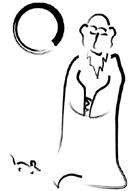On The Way: The Daily Zen Journal
The Unborn pt 4
Bankei (1622-1693)
You’re probably all wondering what this unborn Buddha-mind is like.
The Buddha-mind, unborn and illuminating all things with perfect clarity, is like a mirror, standing clear and spotlessly polished. A mirror, as you know, reflects anything that’s before it. Whatever’s placed in front of it, the shape never fails to be reflected, though the mirror has no idea or intention of doing so. And when the object is taken away, the mirror doesn’t reflect it any longer, though it makes no decision to cease reflecting.
Now that’s just how the unborn Buddha-mind works. You see and hear all things, no matter what they are, although you haven’t generated a single thought to see or hear them, because of the vital working of the unborn Buddha-mind each of you receives at birth.
Once you’ve got the principle of this Unborn fixed in your minds, you’re Unborn whether you’re a man or a woman. You are always unborn. You go along living in the Buddha-mind quite unconscious of being a man or woman. 
Although you each have Buddha-minds, you’ve deprived yourselves of them because of the mistaken way that you’ve been brought up. A lifetime of learning the wrong things. You still have a Buddha-mind, for all the bad things you’ve learned and the delusions your thoughts create for you. You can’t possibly lose it. It’s just darkened by the illusions caused by your selfish desires and partiality.
Perhaps a comparison will help make this clear.
The sun shines day after day without fail, yet if clouds appear to make the sky overcast, it can’t be seen. It still comes up in the east every morning and goes down in the west. The only difference is that you can’t see it because it’s hidden behind the clouds.
The sun is your Buddha-mind, the clouds are your illusions. You are unaware of your Buddha-minds because they’re covered by illusions and can’t be seen. But you never lose them, not even when you go to sleep.
The unborn Buddha-mind that your mothers have given you is thus always there, wonderfully clear and bright and illuminating.
Bankei (1622-1693)
The Japanese Rinzai priest, Bankei, did not leave behind any written exposition of his Zen teaching, and he gave strict orders that no one else was to reduce it to writing.
But records were made nonetheless, his followers being unable to bear the thought that their master’s words and deeds should go unrecounted. So although much more was lost than there were able to commit to paper, we must be grateful for the record they have preserved for us; it is our sole means of learning about his unborn Zen.
He delivered his talks in engagingly plain, everyday Japanese, the ordinary language of the common person. They are popular in the word’s best sense. No one had brought Zen to the ordinary person in such an informal and yet thoroughgoing manner.
Excerpted from Unborn: The Life and Teaching of Zen Master Bankei translated by Norman Waddell




While Bankei’s teaching sounds almost too simple, it is a very deep teaching and a true direct approach. He doesn’t give the students a practice or a set of precepts to follow. There are no sutras to read or other Zen writings; neither does he have them sit in meditation. “My part in this is simply to tell you about it and to try to get you to confirm the Buddha-minds you were all given when you were born.”
How often have we gotten lost in the form of our practice and lost the heart and essence of training? Our minds seem so quick to latch onto a set Way, when in fact the nature of everything around us is change and flow.
The paradox of practice is that it takes a kind of strength to be able to adapt and flow with the now and to be able to ask the very questions which shake the foundation of our views. We need to drop the kind of strength that serves to keep us attached to the small and limited in ourselves. As soon as we “get” an understanding we have to remember to let go of it to allow us to keep expanding our view.
May my mind be clear.
May I live fearlessly
In the Mind of Readiness.
May I rely on nothing
Save Emptiness.
– Ji Aoi Isshi
Toward a Broader View,
Elana, Scribe for Daily Zen